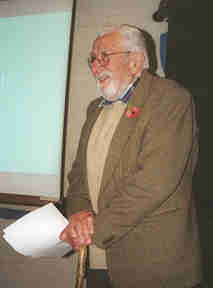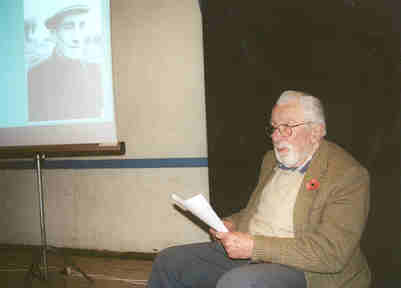
On Friday 9 November 2001, Bob Copper gave his talk on collecting with the BBC in the 1950s at Cecil Sharp House. The illustrated talk was entitled "Songs and Southern Breezes: collecting days with the BBC in the 1950s".
Here is a short excerpt, not from Bob Copper's talk, but from his book with the same title, Songs and Southern Breezes (pp. 126-8).
I spent many pleasant hours in the Fox [North Waltham] on subsequent occasions and one evening met Frank 'Mush' Bond. He was a local man but had spent a lot of his time travelling round the country with the fairground folk and also working as a casual farm-hand in various parts of southern England. This experience had spread a thin veneer of sophistication over his native clay and I found him slightly less easy to deal with than the men who had never left the district.
He seemed to think, for instance, that somebody, somewhere might be after his songs for pecuniary reasons and that any interest shown in them was bound to be prompted by money-making motives. He therefore felt that if any money was to be made he, at least, should have his share. A sentiment I would have shared wholeheartedly if the song-collecting scheme had stemmed from anything other than academic interest. Meeting Frank I was reminded of Steve Barrow, an old shepherd in my own village who, many years ago, declined to sing for Rudyard Kipling on the imagined grounds that 'he (Rudyard Kipling) would be sendin' 'em up to Lunnon an' making a 'mort' o' money out of 'em'.
I did, however, manage to convince him of the purity of my purpose in collecting the songs and that it was for the sole purpose of keeping the songs - and in this case his particular versions - alive. I also pointed out that he should be proud to think that his name and songs would be added to the slender list of those that would go echoing down the corridors of time as a constant reminder to posterity of the sort of songs their agrarian forefathers used to sing. I found this argument most persuasive but Frank remained stubbornly unimpressed and it took several more meetings, and consequently several more pints of ale, before he somewhat reluctantly agreed to sing.
One of his songs was God Bless the Master of this House which was always sung by the mummers at Christmas time. It was sung outside the house that was being visited by way of introduction or as he said 'to open out'. When the song was over the players would be invited in to perform the play. George Gardiner collected this song in 1909 from Daniel Wigg at Preston Candover who was eighty-four years old at the time. Frank remembered old Dan'l Wigg singing it but he actually learnt it from his own father.
God Bless the Master of this House
God bless the master of this house with a gold chain round his neck,
O, where his body sleeps or wakes, Lord send his soul to rest,
And Lord send his soul to rest.
God bless the mistress of this house with a gold chain round her neck,
O, where her body sleeps or wakes Lord Jesus be her guide,
O, Lord Jesus be her guide.
O, mortal man remember thou when Christ the Lord was born,
He was crucified betwixt two thieves and crowned with a thorn,
And was crowned with a thorn.
O, mortal man remember thou when Christ laid on the road,
It was for our sins and wickedness he shod his precious blood,
And he shod his precious blood.
He also sang Sheener's song. 'Sheen' is a contraction of 'machine' and is the local word referring to a threshing machine. A sheener therefore is anyone working in the threshing gang. The song describes the different jobs that are carried out in the operation of the 'sheen' and also introduces many of the local men by name who used to do this work. Frank wrote the words of this song himself in about 1906. It is based on a traditional tune.
But the gem of all his collection, if only he had known the complete song, was Lord Bateman, which he picked up from 'an old lady in Kent who used to travel round with the fair'. That it was incomplete was a tragedy for even the fragment of two verses that he was able to recall brought an unmistakable breath of medieval England, like the tattered shreds of a regiment's battle honours hanging in the cathedral nave remind us of the glory of conquests long past. It was well worth collecting for it must have been several hundred years older than any other song I discovered during the whole of my travels.

Lord Bateman was a rich
noble lord
A rich noble lord of some high degree,
He travel-led east and he travel-led west
Until he come unto proud Turk-ee.
Thanks for information about the talk and for sending the photos to Malcolm Taylor of the EFDSS, and to Derek Schofield for kind permission to reproduce them.
New: 8 March 2002 | Now: 7 March 2002 | Garry Gillard | index